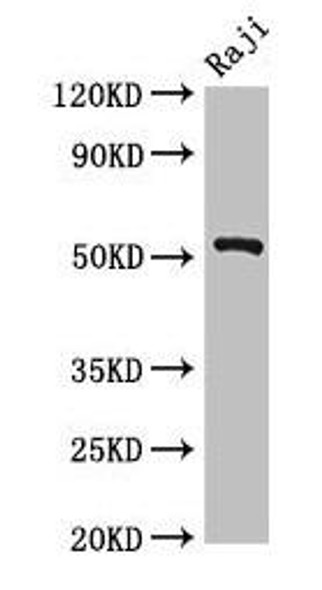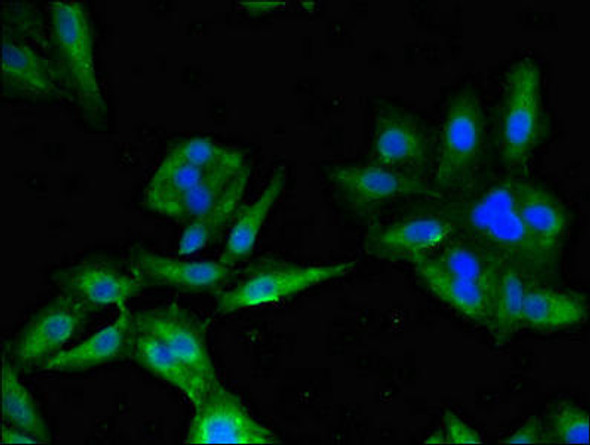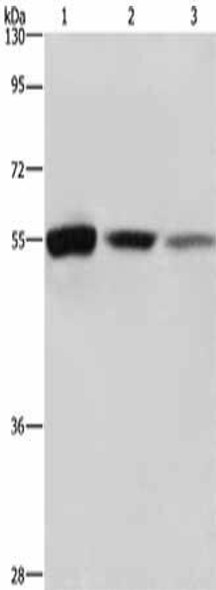Description
Phospho-BLNK (Y84) Antibody (PACO04008)
The Phospho-BLNK (Y84) Antibody (PAC04008) is a valuable tool for researchers studying signaling pathways involved in immune responses. BLNK, also known as B cell linker protein, plays a crucial role in B cell receptor signaling and is phosphorylated at tyrosine 84 in response to various stimuli.This polyclonal antibody, raised in rabbits, is highly specific to the phosphorylated form of BLNK at tyrosine 84 and is suitable for use in Western blot applications. It enables researchers to detect and analyze the phosphorylation status of BLNK in different cell types, providing insight into the mechanisms underlying B cell activation and immune regulation.
Understanding the phosphorylation of BLNK at tyrosine 84 is important for unraveling the complexities of B cell signaling and developing targeted therapies for conditions involving dysregulated immune responses. Whether investigating immune disorders, cancer immunotherapy, or autoimmune diseases, the Phospho-BLNK (Y84) Antibody is a valuable tool for advancing research in immunology and beyond.
| Antibody Name: | Phospho-BLNK (Y84) Antibody |
| Antibody SKU: | PACO04008 |
| Size: | 50ug |
| Host Species: | Rabbit |
| Tested Applications: | ELISA, WB, IHC |
| Recommended Dilutions: | WB:1:500-1:2000, IHC:1:100-1:300 |
| Species Reactivity: | Human, Mouse, Rat |
| Immunogen: | synthesized peptide derived from human BLNK around the phosphorylation site of Y84. |
| Form: | Liquid |
| Storage Buffer: | Liquid in PBS containing 50% glycerol, 0.5% BSA and 0.02% sodium azide. |
| Purification Method: | The antibody was affinity-purified from rabbit antiserum by affinity-chromatography using epitope-specific immunogen. |
| Clonality: | Polyclonal |
| Isotype: | IgG |
| Conjugate: | Non-conjugated |
| Synonyms: | BLNK; BASH; SLP65; B-cell linker protein; B-cell adapter containing a SH2 domain protein; B-cell adapter containing a Src homology 2 domain protein; Cytoplasmic adapter protein; Src homology 2 domain-containing leukocyte protein of 65 kDa; |
| UniProt Protein Function: | BLNK: an adaptor protein that bridges the B-cell receptor-associated kinases (BCR) with a multitude of signaling pathways, regulating biologic outcomes of B-cell function and development. Plays an important role in BCR-mediated PLCG1 activation and Ca(2 ) mobilization. Does not seem to be not required for pre-BCR-mediated activation of MAP kinase and phosphatidyl-inositol 3 (PI3) kinase signaling. Plays a critical role in orchestrating the pro-B cell to pre-B cell transition. Following BCR activation, phosphorylated on tyrosine residues by SYK and LYN. When phosphorylated, serves as a scaffold to assemble downstream targets of antigen activation, including PLCG1, VAV1, GRB2 and NCK1. Its phosphorylation is required for both Ca(2 ) and MAPK signaling pathways. Defects in BLNK are the cause of hypoglobulinemia and absent B-cells.It has tumor supressor activity that is lost in many cases of childhood pre-B acute lymphoblastic leukemia (ALL). Two alternatively spliced isoforms have been described; these are differentially involved in activation and apoptosis of B lymphocytes. |
| UniProt Protein Details: | Protein type:Adaptor/scaffold Chromosomal Location of Human Ortholog: 10q23.2-q23.33 Cellular Component: cytoplasm; cytosol; plasma membrane Molecular Function:protein binding; SH3/SH2 adaptor activity; transmembrane receptor protein tyrosine kinase adaptor protein activity Biological Process: humoral immune response; inflammatory response Disease: Agammaglobulinemia 4, Autosomal Recessive |
| NCBI Summary: | This gene encodes a cytoplasmic linker or adaptor protein that plays a critical role in B cell development. This protein bridges B cell receptor-associated kinase activation with downstream signaling pathways, thereby affecting various biological functions. The phosphorylation of five tyrosine residues is necessary for this protein to nucleate distinct signaling effectors following B cell receptor activation. Mutations in this gene cause hypoglobulinemia and absent B cells, a disease in which the pro- to pre-B-cell transition is developmentally blocked. Deficiency in this protein has also been shown in some cases of pre-B acute lymphoblastic leukemia. Alternatively spliced transcript variants have been found for this gene. [provided by RefSeq, May 2012] |
| UniProt Code: | Q8WV28 |
| NCBI GenInfo Identifier: | 82592659 |
| NCBI Gene ID: | 29760 |
| NCBI Accession: | Q8WV28.2 |
| UniProt Secondary Accession: | Q8WV28,O75498, O75499, Q2MD49, |
| UniProt Related Accession: | Q8WV28 |
| Molecular Weight: | 44,451 Da |
| NCBI Full Name: | B-cell linker protein |
| NCBI Synonym Full Names: | B-cell linker |
| NCBI Official Symbol: | BLNK |
| NCBI Official Synonym Symbols: | bca; AGM4; BASH; LY57; SLP65; BLNK-S; SLP-65 |
| NCBI Protein Information: | B-cell linker protein |
| UniProt Protein Name: | B-cell linker protein |
| UniProt Synonym Protein Names: | B-cell adapter containing a SH2 domain protein; B-cell adapter containing a Src homology 2 domain protein; Cytoplasmic adapter protein; Src homology 2 domain-containing leukocyte protein of 65 kDa; SLP-65 |
| Protein Family: | B-cell linker protein |
| UniProt Gene Name: | BLNK |
| UniProt Entry Name: | BLNK_HUMAN |














